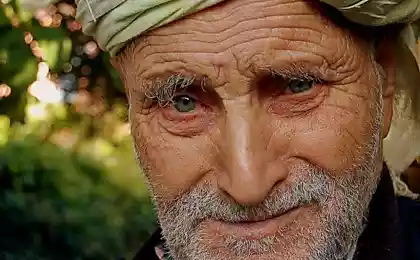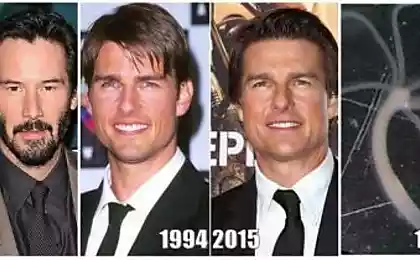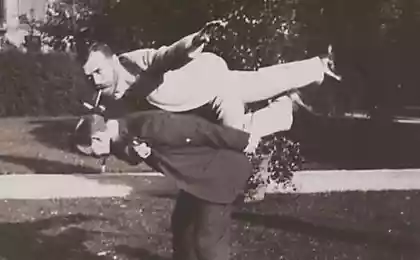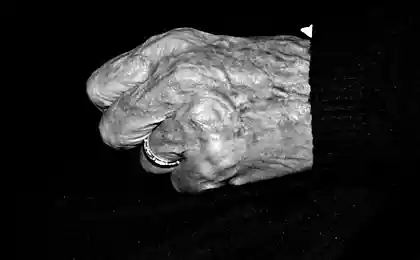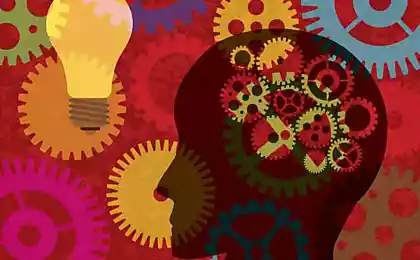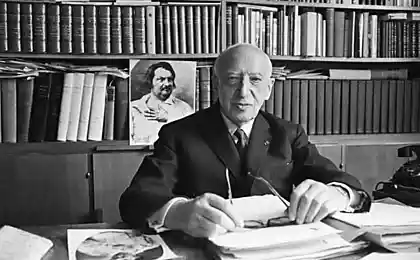491
Alexander mimran: Psychosis aging can be cured
In aging concluded three conflict — revaluation "I", the awareness of the fact of deteriorating health and proximity of death. But person the strength to resolve them, said psychotherapist Alexander mimran.
What is "psychosis of aging"? As for the elderly not to fall into depression, looking at himself in the mirror? Is it possible to from aging positive feelings? This was told by Alexander mimran, a practicing psychologist, psychotherapist, Director of the School of modern psycho.

— Alexander Valerievich, do I need to take your age without complaint, as is, or with the burden of years we have to fight?
— First, let's define the concept of "age". Psychologically and biologically age may not coincide with the calendar and passport. For traditional societies, age is not primarily chronological, and the status bar feature. The status then appears as a psychological and social condition.
The promotion status and the age ladder is not determined by the number of years lived, but rather depends on self-perception in a specific period of his life. How often do we meet young old and old "youths"? The question is rhetorical! Alexander Rosenbaum in one of the songs has the line: "Age is the cost of the candles exceeds the cost of the cakes." Words that accurately determine the psychological status of the aged.
Psychological age depends on passing a special person, event stages of life. In science they are called initiation ceremonies or other similar functions of social procedures. So, the quality of the sensations, and especially the necessity of adopting his age is largely dependent upon these life events. With the burden of years, if it is "easy", you know, fighting is not necessary.
What if it is "heavy"?
— If the person to prepare for the aging, the weight it is lifting. But when such preparation, initiation was not, then all the more difficult. For example, if a youth was not served in the army, in life he may be harder to establish myself as a warrior and as a man. If the girl the woman will not be mother, too. She's 50 and she's in psychological status will be still girl...
The higher the position the person occupies in the pre-retirement life, the harder it is to accept the loss of former social prestige, and it will require special measures may help from a psychologist.
Preparation for transition to another status (grandparent, retirement, divorce, etc.) should be considered as an essential element of the initiation into adulthood and old age as a choice of profession, a spouse at a young age. For example, it is no coincidence that experts compare the retirement social and psychological value of rites of initiation in primitive tribes.
— As in old age not to get depressed looking at myself in the mirror and for young people around?
The mirror reflects the shape that is not seen content. Let me explain: we see what we want to see. And so often see in the mirror not what is actually. As they say: "look, but not see." The mirror enables us to look at, but makes it impossible to see. As a result, the depression organized! Feelings of inferiority, and with it boredom and depression, anxiety and fear can not be avoided. In this situation, the depression is estimated the reaction of the loss of attractiveness (young forms), wider — their status and settings, including professional, job, material and other benefits.
With age, this trend was only growing. People become more introverted, oriented to their inner world, not the cause of the weakening of vital activity and a decline in response for the needs of the environment. The closer to old age, so, alas, the less we pay attention. This circumstance provokes a "withdrawal", creating a feeling of restraint and, consequently, increased propensity to depression.
Men more often than women evaluate themselves in accordance with their social status, so they have confidence with age is lost much faster. Consciousness in this case is narrowed and revolves around personal hardship, and life plans seem less feasible. Depression, experts say, put a man on the neurotic circle: "looking for a way out of the depression in the depression". I have to say, but it's not. The circle is closed...
What to do? We must remember that the real value often hidden behind packaging. The ability to see them — meaning, purpose, and a means of self-help. To seek out need inside and outside: in the recovery of lost contacts and expanding relations with the world. For example, look at a tour group of elderly foreign tourists — these people intuitively found a way out of "the age of the impasse".
By the way, various settings for different effects on health. A high level of depression contributes to the development of chronic diseases in the elderly. And orientation to the outside world is an advantage in recovery, for example from a stroke.
— How many people exposed to so-called "psychosis of aging"?
— Sooner or later and to varying degrees, have the least anxiety about aging. It's natural. Aging first comes to us. How to exist in this story? Question the answer to which everyone will find their own.
It only partly depends on cultural features. Researchers often cite the example of Japan as a society with more than a positive attitude to old age, where national worldviews considers this status as a preparation for a new stage of life.
In our socio-cultural environment, the future for young people is presented as if on the path of self-improvement — say, they were good in the past and in the future will be even better. But the middle-aged and elderly all the best see in the past, and in the future — only worse. This circumstance only increases the problems of the age.
Once the French philosopher and psychologist levy-Bruhl said, "Probably, will disappear civilization that cry, but will never disappear civilization that laugh!" Depression is an appeal to the past, and sometimes present, and the laughter is cast in the future. Laughter is a great cure for sadness!
— Usually begins when the "psychosis of aging"?
At the time, which in science is called crisis. When in consciousness there is a "revolutionary situation": one part of a person's identity (cultural) says: "Want!" and the second (biological): "I can't!". The closer this period, for a person, the higher the probability to fall into the trap.
And when it takes place?
— When the two parts agree, come to a consensus.
— Women and men all it's different?
— Men, according to the traditional sexual stereotype, looking for answers and solutions in the area of social status, professional development and achievements. The updated status is continued in the form of a transfer of experience to young, preserving true motivation of the life and profession of loyalty to the Fatherland and duty.
Women find solace in an emotional attachment to younger relatives (grandchildren, great-grandchildren), "magically" returning own motherhood, and with it the feminine attractiveness. Grandmother — not the old lady!
But often these others require more attention, and most importantly — the systematic recognition of what has not, and probably never was.
Is it possible to get from aging positive feelings of satisfaction, pleasure, enjoyment, thrill?
— Can and should! In aging concluded three conflicts that person the strength to allow. The first was the reassessment of the "I" outside of the professional role. Many working people, especially men, consider their position and himself through the prism of professional activity. Therefore, working people can develop high levels of self esteem simply because it is socially demanded profession. However, with the retirement of his professional status is leveled, and the retiree is forced to substitute another form of their own uniqueness.
The second conflict is associated with the recognition of the deteriorating health and aging of the body. For most people, aging is inevitably accompanied by a reduction in tone and General physical condition. If a person attaches too much importance to their health and life satisfaction, it is waiting for the inevitable disappointment. Successful aging implies the ability to overcome physical discomfort, or at least to find this kind of activity, where the condition of the body is not critical.
The third conflict is associated with the loss of samozabvenno. Essentially, this means that the person has reconciled with the fact of inevitability of death. Obviously, this unpleasant thought can be overcome, worrying about loved ones and trying to improve the life and welfare of loved ones.
This suggests that in order to enjoy old age, people must prepare for it.
Life is, as we are talking about her. "The old woman", "old age", "youth is gone", "all in the past", etc. expressions create the same psychological discomfort, which interferes with age. You need to remove from your vocabulary this terminology.
Sometimes, without thinking, in the bustle of household chores, even young mistress say, "Woman! Forgot to buy butter!", guiltily apologizing to the household. And in the evening, after dinner, suddenly "accidentally" feel a sudden rush of longing for the past, when she was still young...
People crossed the threshold of middle age, and it seems that everything has already crumbled, life is over, no prospects. But many people intuitively find a way out of the apparent impasse. For example, start reading the classics, learning foreign languages, lease rights, if not previously driven a car to travel. And they re-awakens interest in knowledge. They are again looking for their identity — and find her in the area of knowledge and experience.
Think for example of the image of man in Russian fairy tales. It is always a secondary character — as today, by the way, for the state and society. In the tale he is represented in the poverty of form: old robe, long beard, rattrapante, rags. As a rule, it is shown in the background of another young character with an exaggerated beauty or power.
But notice, the old man always plays the role of the sage possessing magical properties, which can give something very good, to send where necessary, to give guiding a ball, to give the wonder horse, wonder weapons, etc to give the main character even more possibilities. And thus, the old man himself was their embodiment.
Knowledge is power, remember this. In folklore, by contrast, bodily infirmity connected with the inner strength that comes from knowledge and experience. The elder man has the power of righteousness, and character-the grandmother — the power of emotional. There is a shift of the importance of visual appeal towards the attractiveness of domestic. That, in fact, is called wisdom.
Why you should not take the book into the hands of a sense of duty to a
Extremely useful skill: Stop thinking about someone else's opinion!
In colloquial Russian the word "man" in relation to the representative of the younger generation usually has a hidden appeal to a certain experience of life, which supposedly has the addressee. "Man, you all know..."
By the way, for folk fairy tales, too, it is the eternal desire to "get rid" of old age, to return the lost youth of a magical way — with the help of "living water", the "rejuvenating apples", etc. Interesting Parallels with today? But this allusion to a universal way of coping with the "psychosis of aging." Actually, it's simple: don't run from yourself, how many years have passed, be yourself. published
Author: Alexander Mimran
Text: Vladimir Voskresensky
P. S. And remember, only by changing their consumption — together we change the world! ©
Source: www.rosbalt.ru/piter/2016/06/02/1519688.html
What is "psychosis of aging"? As for the elderly not to fall into depression, looking at himself in the mirror? Is it possible to from aging positive feelings? This was told by Alexander mimran, a practicing psychologist, psychotherapist, Director of the School of modern psycho.

— Alexander Valerievich, do I need to take your age without complaint, as is, or with the burden of years we have to fight?
— First, let's define the concept of "age". Psychologically and biologically age may not coincide with the calendar and passport. For traditional societies, age is not primarily chronological, and the status bar feature. The status then appears as a psychological and social condition.
The promotion status and the age ladder is not determined by the number of years lived, but rather depends on self-perception in a specific period of his life. How often do we meet young old and old "youths"? The question is rhetorical! Alexander Rosenbaum in one of the songs has the line: "Age is the cost of the candles exceeds the cost of the cakes." Words that accurately determine the psychological status of the aged.
Psychological age depends on passing a special person, event stages of life. In science they are called initiation ceremonies or other similar functions of social procedures. So, the quality of the sensations, and especially the necessity of adopting his age is largely dependent upon these life events. With the burden of years, if it is "easy", you know, fighting is not necessary.
What if it is "heavy"?
— If the person to prepare for the aging, the weight it is lifting. But when such preparation, initiation was not, then all the more difficult. For example, if a youth was not served in the army, in life he may be harder to establish myself as a warrior and as a man. If the girl the woman will not be mother, too. She's 50 and she's in psychological status will be still girl...
The higher the position the person occupies in the pre-retirement life, the harder it is to accept the loss of former social prestige, and it will require special measures may help from a psychologist.
Preparation for transition to another status (grandparent, retirement, divorce, etc.) should be considered as an essential element of the initiation into adulthood and old age as a choice of profession, a spouse at a young age. For example, it is no coincidence that experts compare the retirement social and psychological value of rites of initiation in primitive tribes.
— As in old age not to get depressed looking at myself in the mirror and for young people around?
The mirror reflects the shape that is not seen content. Let me explain: we see what we want to see. And so often see in the mirror not what is actually. As they say: "look, but not see." The mirror enables us to look at, but makes it impossible to see. As a result, the depression organized! Feelings of inferiority, and with it boredom and depression, anxiety and fear can not be avoided. In this situation, the depression is estimated the reaction of the loss of attractiveness (young forms), wider — their status and settings, including professional, job, material and other benefits.
With age, this trend was only growing. People become more introverted, oriented to their inner world, not the cause of the weakening of vital activity and a decline in response for the needs of the environment. The closer to old age, so, alas, the less we pay attention. This circumstance provokes a "withdrawal", creating a feeling of restraint and, consequently, increased propensity to depression.
Men more often than women evaluate themselves in accordance with their social status, so they have confidence with age is lost much faster. Consciousness in this case is narrowed and revolves around personal hardship, and life plans seem less feasible. Depression, experts say, put a man on the neurotic circle: "looking for a way out of the depression in the depression". I have to say, but it's not. The circle is closed...
What to do? We must remember that the real value often hidden behind packaging. The ability to see them — meaning, purpose, and a means of self-help. To seek out need inside and outside: in the recovery of lost contacts and expanding relations with the world. For example, look at a tour group of elderly foreign tourists — these people intuitively found a way out of "the age of the impasse".
By the way, various settings for different effects on health. A high level of depression contributes to the development of chronic diseases in the elderly. And orientation to the outside world is an advantage in recovery, for example from a stroke.
— How many people exposed to so-called "psychosis of aging"?
— Sooner or later and to varying degrees, have the least anxiety about aging. It's natural. Aging first comes to us. How to exist in this story? Question the answer to which everyone will find their own.
It only partly depends on cultural features. Researchers often cite the example of Japan as a society with more than a positive attitude to old age, where national worldviews considers this status as a preparation for a new stage of life.
In our socio-cultural environment, the future for young people is presented as if on the path of self-improvement — say, they were good in the past and in the future will be even better. But the middle-aged and elderly all the best see in the past, and in the future — only worse. This circumstance only increases the problems of the age.
Once the French philosopher and psychologist levy-Bruhl said, "Probably, will disappear civilization that cry, but will never disappear civilization that laugh!" Depression is an appeal to the past, and sometimes present, and the laughter is cast in the future. Laughter is a great cure for sadness!
— Usually begins when the "psychosis of aging"?
At the time, which in science is called crisis. When in consciousness there is a "revolutionary situation": one part of a person's identity (cultural) says: "Want!" and the second (biological): "I can't!". The closer this period, for a person, the higher the probability to fall into the trap.
And when it takes place?
— When the two parts agree, come to a consensus.
— Women and men all it's different?
— Men, according to the traditional sexual stereotype, looking for answers and solutions in the area of social status, professional development and achievements. The updated status is continued in the form of a transfer of experience to young, preserving true motivation of the life and profession of loyalty to the Fatherland and duty.
Women find solace in an emotional attachment to younger relatives (grandchildren, great-grandchildren), "magically" returning own motherhood, and with it the feminine attractiveness. Grandmother — not the old lady!
But often these others require more attention, and most importantly — the systematic recognition of what has not, and probably never was.
Is it possible to get from aging positive feelings of satisfaction, pleasure, enjoyment, thrill?
— Can and should! In aging concluded three conflicts that person the strength to allow. The first was the reassessment of the "I" outside of the professional role. Many working people, especially men, consider their position and himself through the prism of professional activity. Therefore, working people can develop high levels of self esteem simply because it is socially demanded profession. However, with the retirement of his professional status is leveled, and the retiree is forced to substitute another form of their own uniqueness.
The second conflict is associated with the recognition of the deteriorating health and aging of the body. For most people, aging is inevitably accompanied by a reduction in tone and General physical condition. If a person attaches too much importance to their health and life satisfaction, it is waiting for the inevitable disappointment. Successful aging implies the ability to overcome physical discomfort, or at least to find this kind of activity, where the condition of the body is not critical.
The third conflict is associated with the loss of samozabvenno. Essentially, this means that the person has reconciled with the fact of inevitability of death. Obviously, this unpleasant thought can be overcome, worrying about loved ones and trying to improve the life and welfare of loved ones.
This suggests that in order to enjoy old age, people must prepare for it.
Life is, as we are talking about her. "The old woman", "old age", "youth is gone", "all in the past", etc. expressions create the same psychological discomfort, which interferes with age. You need to remove from your vocabulary this terminology.
Sometimes, without thinking, in the bustle of household chores, even young mistress say, "Woman! Forgot to buy butter!", guiltily apologizing to the household. And in the evening, after dinner, suddenly "accidentally" feel a sudden rush of longing for the past, when she was still young...
People crossed the threshold of middle age, and it seems that everything has already crumbled, life is over, no prospects. But many people intuitively find a way out of the apparent impasse. For example, start reading the classics, learning foreign languages, lease rights, if not previously driven a car to travel. And they re-awakens interest in knowledge. They are again looking for their identity — and find her in the area of knowledge and experience.
Think for example of the image of man in Russian fairy tales. It is always a secondary character — as today, by the way, for the state and society. In the tale he is represented in the poverty of form: old robe, long beard, rattrapante, rags. As a rule, it is shown in the background of another young character with an exaggerated beauty or power.
But notice, the old man always plays the role of the sage possessing magical properties, which can give something very good, to send where necessary, to give guiding a ball, to give the wonder horse, wonder weapons, etc to give the main character even more possibilities. And thus, the old man himself was their embodiment.
Knowledge is power, remember this. In folklore, by contrast, bodily infirmity connected with the inner strength that comes from knowledge and experience. The elder man has the power of righteousness, and character-the grandmother — the power of emotional. There is a shift of the importance of visual appeal towards the attractiveness of domestic. That, in fact, is called wisdom.
Why you should not take the book into the hands of a sense of duty to a
Extremely useful skill: Stop thinking about someone else's opinion!
In colloquial Russian the word "man" in relation to the representative of the younger generation usually has a hidden appeal to a certain experience of life, which supposedly has the addressee. "Man, you all know..."
By the way, for folk fairy tales, too, it is the eternal desire to "get rid" of old age, to return the lost youth of a magical way — with the help of "living water", the "rejuvenating apples", etc. Interesting Parallels with today? But this allusion to a universal way of coping with the "psychosis of aging." Actually, it's simple: don't run from yourself, how many years have passed, be yourself. published
Author: Alexander Mimran
Text: Vladimir Voskresensky
P. S. And remember, only by changing their consumption — together we change the world! ©
Source: www.rosbalt.ru/piter/2016/06/02/1519688.html
